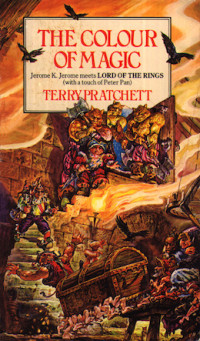In early January, the International Union of Pure and Applied Chemistry (IUPAC) announced the discovery of four new elements to be added to the periodic table. But first, elements 113, 115, 117, and 118 must be named. And while this decision is usually up to the scientists who discovered them, a chemist and blogger has launched a petition requesting that element 117 be named octarine, after the color of magic in Terry Pratchett’s Discworld books.
A U.S.-Russian team first created the incredibly rare element 117 in 2010 at the Joint Institute for Nuclear Research in Dubna, Russia. As Scientific American explained in 2014, protons heavier than uranium (which has 92 protons) aren’t often found in nature, and must instead be forced into existence in laboratories by smashing elements together. With its 117 protons, element 117 has a half-life of only about 50 thousandths of a second; before you had even finished reading that clause, half of element 117 would already have decayed into a lighter element.
Dr. Kat Day, who blogs at The Chronicle Flask, makes the case that element 117’s rareness is part of the reason it should be named for Discworld’s magic, which in that universe can be seen only by wizards and cats. Further, she suggests that the element be octarine, with a symbol of Oc and a pronunciation of “ook” (after the Discworld Librarian’s utterances). While sentimental, Day’s reasoning in her petition also draws on science:
Octarine, in the Discworld books, is known as “the colour of magic,” which forms the title of Pratchett’s first ever Discworld book. According to Disc mythology, octarine is visible only to wizards and cats, and is generally described as a sort of greenish-yellow purple colour, which seems perfect for what will probably be the final halogen in the periodic table. Octarine is also a particularly pleasing choice because, not only would it honour a world-famous and much-loved author, but it also has an “ine” ending, consistent with the other elements in group 17.
Since 1947, IUPAC has taken the responsibility of naming elements; this piece from BBC Science explains how scientists have drawn from Greek, Latin, and Roman terms, a certain Scottish village, and proper names in their decisions. Both before and after IUPAC taking over the responsibility of naming, there have been plenty of controversies arising over simultaneous discoveries, lack of corroboration, and disputes over whether to name an element after a living person.
Day, for her part, draws upon the IUPAC rule that an element name can come from mythology:
Octarine is being counted as “a mythological concept” under IUPAC rules, which state that elements must be named after “a mythological concept or character; a mineral, or similar substance; a place or geographical region; a property of the element; or a scientist.” The Discworld stories are certainly stories about gods and heroes, and 70 million books surely count for something.
The petition currently has 43,919 signatures.










